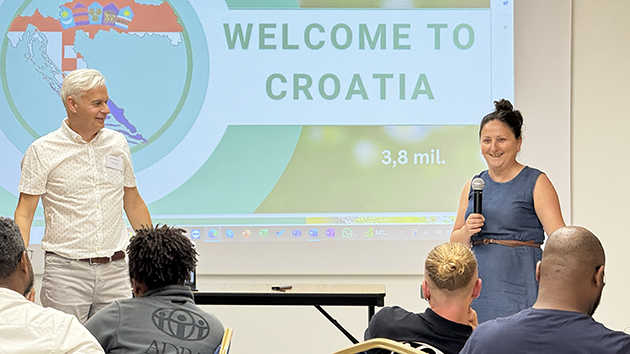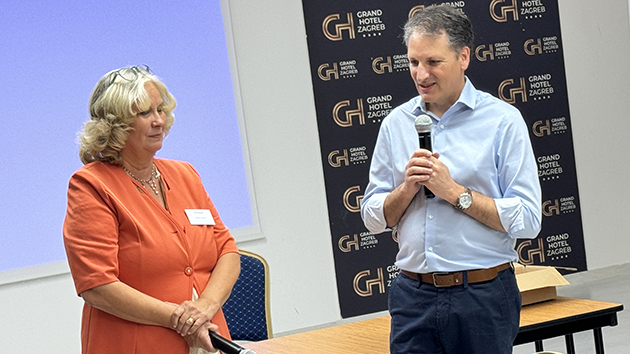ADRA Europe Forum Highlights Strategic Plans and Emergency Preparedness
Meeting in Croatia signals renewed commitment to compassionately serving those in need.
Corina Wagner with tedNEWS
(ADRA) program and country directors convened in Zagreb, Croatia, for the ADRA Europe Forum.
This gathering provided an opportunity for leaders across Europe to discuss joint strategies, global trends, and the future of humanitarian work in the region and beyond. Leaders from ADRA International also attended, offering insights from a global perspective.
ADRA Europe director João Martins highlighted the relevance of the Forum, stating, “Bringing European ADRA leaders together to discuss the future of the agency is crucial for gathering the necessary insights for ADRA to thrive.” Martins added that witnessing the active engagement of leaders was inspiring, “assuring us that ADRA will continue to serve those in need with professionalism and compassion.”

Slavica Marčeta (right), from ADRA Croatia, welcomes fellow ADRA directors to Croatia with fun facts about the country, joined by Thomas Petracek, head of Programs for ADRA Europe. [Photo: Luis Herranz, ADRA Europe]
Better Emergency Management
“The worldwide ADRA network engages in an average of 2.5 new national emergency projects per week,” Michael Peach, senior coordinator for Network Emergency Preparedness at ADRA International, said. Consequently, attendees at the forum focused on strengthening local emergency response capabilities and building volunteer and church capacities across Europe.
It was noted that, in recent years, ADRA has trained more than 530 emergency response team members worldwide. Reflecting its commitment to handle crises better and support long-term recovery, ADRA is also working on combining development skills with disaster response and peacebuilding. Additionally, over the coming months, ADRA will launch new tools to support the mental health and psychosocial well-being of Emergency Response Workers (ERWs).

ADRA Europe director João Martins (right) thanks Siri Bjerkan Karlsson, country director of ADRA Sweden (left) and Birgit Philipsen, country director of ADRA Denmark (not pictured) for their longstanding service with ADRA. Both are planning to retire soon. [Photo: Luis Herranz, ADRA Europe]
Collaboration between ADRA and the Church
A key discussion focused on the collaboration between ADRA and local churches. Daniel Duda, president of the Trans-European Division (TED) of the Seventh-day Adventist Church, emphasized, “We are called to live a life reflecting God’s kingdom and using the gifts He has given us.” Basing his message on Matthew 24 and 25 in the Bible, he stated that this holy call embraces everyone, “not just pastors, to live out their faith and compassion in their daily vocations.”
Where is the church on a Monday morning? “Where members … live out their faith and compassion in their daily vocations,” Duda said.
Global Challenges and Adapting to New Trends
In a timely presentation, Rilli Lappalainen, president of the European Confederation of NGOs (CONCORD Europe), underscored the urgency of addressing planetary limitations and climate change. Lappalainen’s insights on climate change impacts, state-based conflicts, and shifts in funding priorities sparked deep reflections from all attendees. Other presentations on challenges and new trends, including changes in EU humanitarian aid policies, digitalization, and gender equality, were very helpful to attending leaders.

“Where is the church on a Monday morning? Where members … live out their faith and compassion in their daily vocations,” Trans-European Division president Daniel Duda said. [Photo: Luis Herranz, ADRA Europe]
Recognizing the privilege of working in the aid and development sector, Petracek concluded, “We impact thousands of vulnerable families and individuals worldwide through health, education, livelihood, and emergency response. This is a privilege we humbly recognize, motivating us to work on solutions for a better and more peaceful future.”
The original version of this story was posted on the tedNEWS news site.